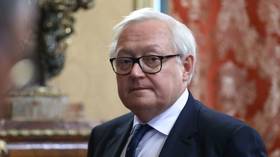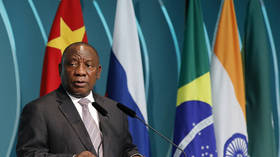
Suggestions that the event could be moved due to Vladimir Putin’s ICC warrant are a hoax, says Russian Deputy FM Sergey Ryabkov

Russian Deputy Foreign Minister Sergey Ryabkov © Press Service of the Ministry of Foreign Affairs of the Russian Federation; RIA Novosti
Russia has quashed reports suggesting that this summer’s BRICS summit could be moved from South Africa to China due to the International Criminal Court’s arrest warrant for Russian President Vladimir Putin. Deputy Foreign Minister Sergey Ryabkov described these suggestions as a hoax.
“I think that this is from the category of information stuffing. From my contacts with colleagues from South Africa and from China, there is no basis to somehow operationalize this matter. This is not the plot that we are discussing here,” he told journalists in Cape Town on Thursday.
He stated that the summit, which will include Brazil, Russia, India, China, and South Africa, will be held as agreed in Johannesburg at the end of August. “There is no other date today, and I don’t think that this topic needs to be spun any further,” Ryabkov said.
The diplomat suggested that the false reports were an attempt to “complicate regular work in the BRICS format,” and an attempt to “impose some kind of false agenda.”
“We work calmly, under the plan that is well known: that the summit will be held in Johannesburg this year, and in Kazan (Russia) next year,” Ryabkov said.
The deputy foreign minister’s comments come after Reuters reported on Wednesday, citing an anonymous official, that South Africa may ask China to host the upcoming BRICS summit to avoid having to deal with the ICC’s arrest warrant for Vladimir Putin.

Read more
The ICC issued the warrant in March, accusing the Russian president of war crimes based on Ukraine’s claims that children had been forcibly relocated during the ongoing military conflict between the two countries.
Moscow has insisted that civilians were not “forcibly removed” but evacuated from an area under Ukrainian artillery fire. Russia has also said it does not recognize the ICC’s jurisdiction, making the warrant null and void.
South Africa, on the other hand, as a signatory of the Rome Statute, is legally obligated to execute ICC arrest warrants, even if they pertain to world leaders such as Vladimir Putin. Pretoria has been considering passing a law that would grant it discretion in enforcing such warrants.




